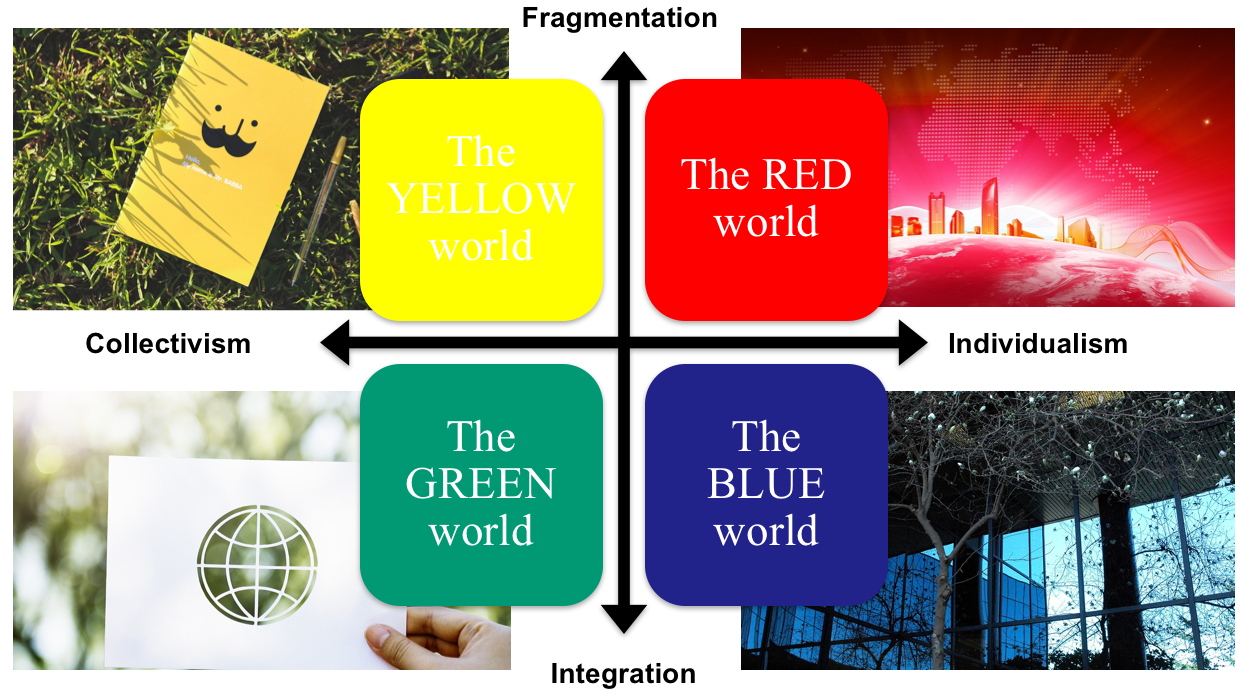The world of work is changing, we all hear about it, read about it and experience it. There is an increasing amount of self-checkout machines in customer care, more and more people are getting involved in virtual jobs, and employers are ever more eager to hire people with abilities to learn and adapt, rather than with fixed knowledge or skills… All these changes happened quite rapidly, and the pace of change—driven by technology, automation and AI in particular—seems only to accelerate. What is there to expect in another decade then?
Recent research by PwC looked exactly into such future and developed the ‘Four Worlds of Work’, namely, four possible scenarios that could await us by 2030. The scenario(s) of our future depend on how humans respond to the main forces of change, the megatrends. Apart from the megatrend of technological breakthrough, PwC research identified also the forces of demographic shifts (size and age of population), urbanization, global economic power shifts, and natural hazards (e.g. climate change, depleted resources). These megatrends are expected to reshape society, and one way or another we already are and will be adapting to them…
Thinking about the human dynamics in response to the megatrends, the PwC professionals suggest two main dimensions along which we might be moving in the world of work. First, take collectivism vs individualism, which implies that we will either unite and take collective responsibility for the common good, or stick to our individual needs and ‘me first’ rules. Trump’s ‘America first’ rhetoric with the ensuing bans on migration and withdrawal from the Paris climate accord seems to be a good example of the latter. The second dimension, business fragmentation vs integration, is about the choice between the direction towards rather small companies, or the power of the big business, respectively. Now, the vision of our future world of work depends on where will we move in the matrix of these dimensions…

If humanity responds to the megatrends with individualism and fragmentation of business, by 2030 we will end up in ‘the RED WORLD’, where innovation rules. In the Red World, the market is vibrant and hungry for innovation as there is ongoing competition between smaller organizations and individuals to satisfy customers. Digital platforms support such a market, and if you possess the know-how of the required speciality, or find a niche, you will be flourishing here. Highly skilled, agile and adaptive freelancers and start-ups seem to be well prepared for this scenario.
If we will stick to individualism, yet move towards integration of business, we will get to ‘the BLUE WORLD’, where the corporate is king. Capitalism and big companies flourish, so do employees with good careers in these ‘borderless’ corporations. Being ‘in’ would mean relative job security and motivating rewards, yet it will also demand constant performance pressures and effort not to be replaced by someone else. There will be a huge gap between those, who are ‘in’ and the unfortunate ones, who are ‘out’.
In ‘the GREEN WORLD’, companies are still big (i.e. integration), but on the other dimension we move towards collectivism, which means that companies care. Social responsibility will become corporations’ main agenda, and workers will choose organizations that care and where work is meaningful. Today, the companies with high ethical standards, outspoken socially responsible positions, and visible initiatives towards environmental protection, human rights or alleviation of unfairness and suffering of any kind, are the ones most prepared for the Green World.
Finally, still caring for the common good, yet moving towards fragmentation of business, will get us to ‘the YELLOW WORLD’, where humans come first. The common good and ethical choices are still on the agenda, yet the market is vibrant and bustles with innovation and creativity. Small businesses and independent workers with meaningful missions will flourish in the Yellow world. Societal impact and collaboration are the currencies embraced here.
Is any of these worlds clearly better and safer for everyone? Probably not. It is also quite unlikely that we will end up with one clear option of the four, but rather might plan for a mix and prepare for all possible outcomes. Reading the report and thinking about the four worlds, I personally had a preference though and started contemplating what I can do to make my vote count…

